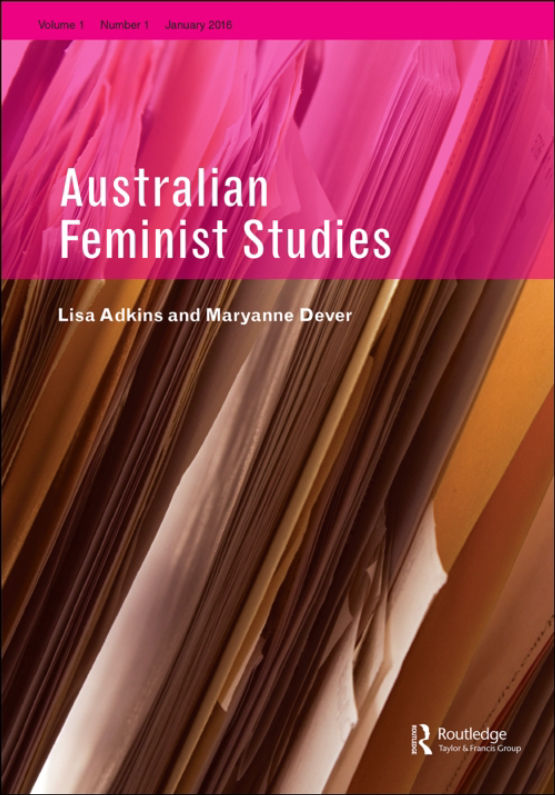Submit a Manuscript to the Journal
Australian Feminist Studies
For a Special Issue on
Feminist Methods and Interventions on AI Ethics
Abstract deadline
Manuscript deadline

Special Issue Editor(s)
Eleanor Drage,
The University of Cambridge, Leverhulme Centre for the Future of Intelligence
ed575@cam.ac.uk
Jennifer Rhee,
Virginia Commonwealth University
jsrhee@vcu.edu
Nassim Parvin,
The University of Washington Information School
nassimi@uw.edu
Feminist Methods and Interventions on AI Ethics
Expressions of interest are sought for contributions to a planned Special Issue (SI) of Australian Feminist Studies devoted to underexplored and novel feminist methods and interventions on AI ethics. While dominant approaches to AI ethics have been focused on reductive notions of bias or value checklists for reducing harms, intersectional feminist scholars have built upon genealogies of feminist scholarship to identify and outline the broader and more nuanced ethical issues that arise in the design and application of such technologies. For example, conversations around bias often assume that bias can be removed from machine learning systems through technical debiasing mechanisms which return data to a state of desirable neutrality. Feminist interventions have illuminated how such debiasing approaches assume the possibility of neutral technology, one that goes against the understanding of technology as inherently situated and political. Moreover, these interventions ignore the power dynamics that shape data work, such as the organisational histories, hierarchies, and pressures that frame and structure the work of data annotation and the construction of datasets’ ground truths alike. Meanwhile, prominent technocratic conversations around the dangers of artificial general intelligence (AGI) obscure the ongoing harms of algorithmic systems (particularly for minoritised communities), which have been carefully identified by feminist thinkers across a range of technologies. Further, the AI industry touts AI as inevitable, thus attempting to foreclose possibilities that imagine otherwise. Feminist scholars and practitioners have corrected this claim of inevitability by identifying histories and ongoing practices of tech development and refusal inspired by more just, creative, and capacious futures.
We invite contributions on strands of feminist thought, methods, and interventions as they open up novel areas for research on AI ethics or offer nuanced insights on AI beyond the mainstream. We seek contributions from a wide range of disciplinary perspectives that reflect on diverse cultures and populations located within and across different national and regional areas. Contributions will be considered from all disciplines engaged with feminist thought and AI. We are particularly interested in interdisciplinary and intersectional analyses from scholars from a range of backgrounds and across subject areas including the application of AI (e.g., education or incarceration), methodologies of its production (e.g., labour or ecological concerns), industrial and historical roots (e.g., governmentality, military, or resistance and refusal), and theoretical concepts (e.g., technosymbiosis or feminist pragmatism). Contributions might also focus on analyses of AI that use intersectional methods and theories in postcolonial studies, trans studies and trans feminism, disability studies, critical race and ethnic studies, and queer studies, among others.
Submission Instructions
Contributions can be between 6-8,000 words for research articles. Shorter provocations of 2,000-5,000 words can be considered for the ‘Feminist Debates’ section. While the expectation is that contributions will be scholarly in orientation, we welcome polemical, autobiographic, and formally experimental pieces. We also welcome contributions that speak to creative, artistic, and activist approaches as well as co-authored and collaborative contributions. All submissions will be peer-reviewed as per the journal’s policies.
EOIs should be 200-300 words. They should indicate what questions or ideas you wish to address, the proposed length of your submission, and your keywords. Please include contact information and a 2 line biographical note.
Please send an EOI to ed575@cam.ac.uk by June 30, 2025. Final papers are due in September 2025, and should be submitted via the Journal's submission site using the 'submit an article' button on this page or the Australian Feminist Studies homepage.
Please send inquiries to the SI editors. Eleanor Drage ed575@cam.ac.uk, Nassim Parvin, nassimi@uw.edu, Jennifer Rhee jsrhee@vcu.edu.

